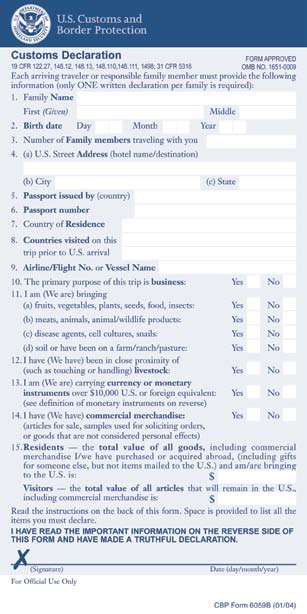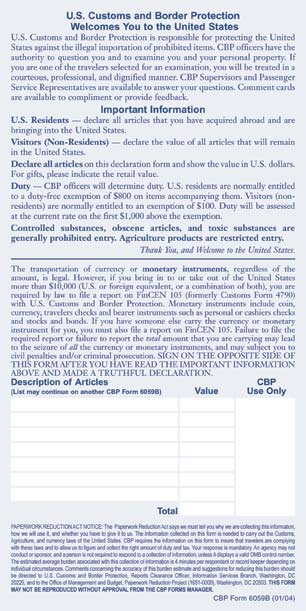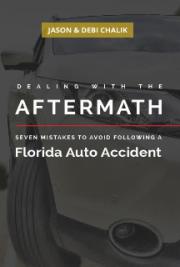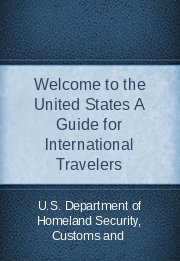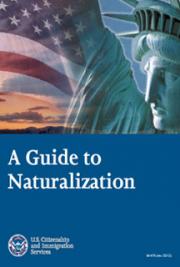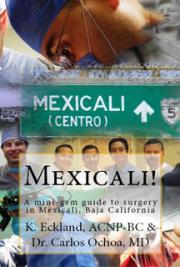6300 NW 36 Street
Miami, FL 33122
Telephone (305) 526-2926 • Fax (305) 526-2929
Los Angeles
Los Angeles International Airport
11850 South La Cienega Blvd .
Hawthorne, CA 90250
Telephone (310) 725-1970
Fax (310) 725-9119
For additional information visit the APHIS Web site at
www.aphis.usda.gov/subjects/animal_health/index.shtml.
Other common pets such as rabbits, ferrets, hamsters,
gerbils and guinea pigs may be imported if they are
in good health . The importation of reptiles and inver-
tebrates is restricted; please contact the U .S . Fish and
Wildlife Service for additional guidance . Most species of
snails are not admissible . Contact APHIS for additional
information . All civets, African rodents and nonhuman
primates are prohibited except for science, education
and exhibition . These species cannot be imported as
pets . Contact CDC for additional information www.cdc.
gov/ncidod/dq/animal/index.htm.
48
Know Before You Go
Plants and seeds
Some plants, cuttings, seeds that are capable of prop-
agation, unprocessed plant products and certain
endangered species are allowed into the United States
but require import permits and other documents; some
are prohibited entirely . Threatened or endangered spe-
cies that are permitted must have export permits from
the country of origin .
Every single plant or plant product including handicraft
items made with straw, must be declared to the CBP
officer and must be presented for CBP inspection, no
matter how free of pests it appears to be . For informa-
tion on importing plants or plant products visit www.
aphis.usda.gov/ppq/permits/plantproducts/index.html.
Soil
Soil is considered the loose surface material of the
earth in which plants, trees, and scrubs grow . In most
cases, the soil consists of disintegrated rock with an
admixture of organic material and soluble salts . Soil
is prohibited entry unless accompanied by an import
permit . Soil must be declared and the permit must be
verified .
Textiles and Clothing
In general, there is no limit to how much fabric and
clothing you can bring back as long as it is for your
personal use or as gifts . If you have exceeded your
personal exemption, you may have to pay duty on the
items . Unaccompanied personal shipments (packages
that are mailed or shipped), however, may
limitations on amount .
On January 1, 2005, quotas for all countries that are
part of the World Trade Organization (WTO) were
eliminated . There are still some countries, like Vietnam,
that are not part of the WTO that have quotas in
place for commercial shipments . These countries may
require an additional document called a “visa” accom-
pany the shipment .
China could have limits on particular garments called
“safeguards .” It is recommended that you contact a CBP
import specialist in your area or at the port where you
Know Before You Go
49
plan to import to determine what countries are subject
to quotas and what products from China are subject to
safeguards .
There may be additional documentation required for
textiles from other countries such as the African coun-
tries that require a visa to be placed on a commercial
invoice in order to get duty-free treatment . There may
also be a certificate of eligibility document require-
ment to get duty-free treatment under many of the
free trade agreements that are negotiated between the
United States and the foreign government . These are
not admissibility documents, but allow you to import
your garments duty-free, provided certain conditions
are met .
Trademarked and Copyrighted Articles
CBP enforces laws relating to the protection of trade-
marks and copyrights . Articles that infringe a federally
registered trademark or copyright or copyright pro-
tected by the Berne Convention for the Protection of
Literary and Artistic Works are subject to detention and/
or seizure . Infringing articles may consist of articles
that use a protected right without the authorization of
the trademark or copyright owner or articles that copy
or simulate a protected right .
Articles bearing marks that are counterfeit or inap-
propriately using a federally registered trademark are
subject to seizure and forfeiture . The importation of
articles intended for sale or public distribution bearing
counterfeit marks may subject an individual to a civil
fine if the registered trademark has also been recorded
with CBP . Articles bearing marks that are confusingly
similar to a CBP recorded registered trademark, and
restricted gray market articles (goods bearing genuine
marks not intended for U .S . importation for which CBP
granted gray market protection) are subject to detention
and seizure .
However, travelers arriving in the United States may
be permitted an exemption and allowed to import one
article of each type, which must accompany the person,
bearing a counterfeit, confusingly similar or restricted
50
Know Before You Go
gray market trademark, provided that the article is for
personal use and is not for sale .
This exemption may be granted not more than once
every 30 days . The arriving passenger may retain one
article of each type accompanying the person . For
example, an arriving person who has three purses,
whether each bears a different infringing trademark, or
whether all three bear the same infringing trademark,
is permitted only one purse . If the article imported
under the personal exemption provision is sold within
one year after the date of importation, the article or its
value is subject to forfeiture .
In regard to copyright infringement, articles that are
determined by CBP to be clearly piratical of a protected
copyright, i .e ., unauthorized articles that are substan-
tially similar to a material protected by a copyright, are
subject to seizure . A personal use exemption for articles,
similar to that described above also applies to copy-
righted articles for the personal, non-commercial use of
the importer and are not for sale or distribution .
You may bring back genuine trademarked and copy-
righted articles (subject to duties) . Products subject to
copyright protection most commonly imported include
software on CD-ROMs, sound recordings, toys, stuffed
animals, clothing with cartoon characters, videotapes,
DVDs, music CDs and books . Products subject to trade-
mark protection most commonly imported include
handbags and accessories, and clothing .
Money And Other Monetary
Instruments
You may bring into or take out of the country, includ-
ing by mail, as much money as you wish . However, if
it is more than $10,000, you will need to report it to
CBP . Ask the CBP officer for the Currency Reporting
Form (FinCen 105) . The penalties for non-compliance
can be severe .
“Money” means monetary instruments and includes U .S .
or foreign coins currently in circulation, currency, trav-
elers’ checks in any form, money orders, and negotiable
instruments or investment securities in bearer form .
Know Before You Go
51
Photographic Film
CBP will not examine film you bought abroad and
are bringing back unless the CBP officer has reason to
believe it contains prohibited material, such as child
pornography .
You will not be charged duty on film bought in the
United States and exposed abroad, whether it is devel-
oped or not . But film you bought and developed abroad
counts as a dutiable item .
CBP’s Pledge to Travelers
• We pledge to cordially greet and welcome you to
the United States .
• We pledge to treat you with courtesy, dignity
and respect .
• We pledge to explain the CBP process to you.
• We pledge to have a supervisor listen to your
comments .
• We pledge to accept and respond to your com-
ments in written, verbal or electronic form .
• We pledge to provide reasonable assistance due
to delay or disability .
If you have a concern or need help understanding
CBP regulations and procedures, ask to speak with the
supervisor on duty .
If you have any questions about CBP procedures,
requirements, or policies regarding travelers, or if you
have any complaints about treatment you received from
CBP officers or about your CBP processing, please write
to:
Customer Service Center
Office of Public Affairs, Room 3 .4-A
U .S . Customs and Border Protection
1300 Pennsylvania Avenue, NW
Washington, DC 20229
Or call 1 .877 .CBP .5511 (1 .877 .227 .5511) .
52
Know Before You Go
Allegations of criminal or serious misconduct may
be reported to the Joint Intake Center by telephone
at 1.877.2INTAKE (1.877.246.8253), by email to Joint.
Intake@dhs .gov, by fax to 202 .344 .3390, or by mail
to:
U .S . Customs and Border Protection
P .O . Box 14475
1200 Pennsylvania Avenue, NW
Washington, DC 20044
DHS Traveler Redress Inquiry
Program
The Department of Homeland Security’s Traveler
Redress Inquiry Program (DHS TRIP) provides a single
point of contact for individuals who have inquiries or
seek resolution regarding difficulties they experienced
during their travel screening at airports or train sta-
tions or crossing U .S . borders, including:
• Denied or delayed airline boarding;
• Denied or delayed entry into and exit from the
United States at a port of entry; or
• Continuously referred to secondary screening.
To initiate an inquiry, please log onto DHS TRIP’s inter-
active Web site at www.dhs.gov/trip.
You will be asked to describe your concerns and expe-
rience, provide contact information and be assigned a
case number to help you monitor the progress of your
inquiry .
After filing online, you will be asked to provide sup-
porting documentation within 30 days . DHS TRIP will
process your request after the supporting paperwork is
received . You may check the status of your request at
any time through the DHS TRIP Web site at www.dhs.
gov/trip.
Know Before You Go
53
Other Travel-Related
Information
Planning for healthy travel: International travelers
can take a number of simple steps to avoid potential
health problems before and during travel . Contact your
physician, local health department, or private or public
agencies that advise international travelers at least 4 to
6 weeks before departure to schedule an appointment
to receive current health information on the countries
you plan to visit, obtain vaccinations and prophylactic
medications as indicated, and address any special needs .
Travel health information from the Centers for Disease
Control and Prevention can be found at wwwn.cdc.gov/
travel/default.aspx
Animals also are susceptible to contracting diseases that
were brought back to the United States by unknow-
ing international travelers: diseases such as Exotic
Newcastle Disease and Avian Influenza that can deci-
mate local poultry populations; Swine Flu, Foot and
Mouth disease and other animal diseases .
Passports are issued by the U .S . Department of State
Passport Agency . Please contact the Passport Agency
nearest you for more information . Postal clerks also
accept passport applications . Additional information
can be found at www.travel.state.gov.
Baggage allowance: Ask the airline or steamship line on
which you are traveling for more information . Contact
the Transportation Security Administration at www.tsa.
gov
Currency of other nations: Your local bank can be of
assistance .
Foreign countries: For information about the country
you will visit or about what articles may be imported
or brought into that country, contact that country’s
embassy, consular office, or tourist information office .
Glossary Of Terms
Accompanied baggage – Baggage that you have with
you when you return to the United States .
54
Know Before You Go
CBP – U .S . Customs and Border Protection was cre-
ated in 2003 by combining the U .S . Customs Service,
Immigration Inspection Service, Animal Plant and
Health Inspection Service, and the U .S . Border Patrol
into one border agency .
DHS – Department of Homeland Security is the parent
agency of CBP and also was created in 2003, after the
9/11 attacks on the United States .
Dutiable – Items on which duty may have to be paid .
Most items have specific duty rates, which are deter-
mined by a number of factors, including where you got
the item, where it was made, and what it is made of .
Duty-free – This is merchandise you may bring back to
the United States without having to pay duty .
Duty-free exemption – see Personal exemption
Flat duty rate – When determining the duty of the
items a traveler brings with them upon their return to
the U .S .: after the personal exemption of $200, $800 or
$1,600; the next $1000 of merchandise will be charged
a flat rate of duty of 1 .5 percent or 3 percent .
GSP – The Generalized System of Preferences is a trade
program that gives duty preferences – that is a free
rate of duty – for certain goods in certain developing
countries .
Joint declaration – Family members who live in the
same home and return together to the United States
may combine their personal exemptions instead of each
family member filing an individual declaration .
Personal exemption – The total value of merchandise
you may bring back to the United States without having
to pay duty .
Prohibited items – Items that are not allowed into the
United States under any circumstances .
Restricted items – Items that are allowed into the
United States but have a condition for importation .
Know Before You Go
55
They may be limited in number or may need a license
to bring into the United States .
Visa Waiver Program – The Visa Waiver Program
enables nationals of certain countries to travel to the
United States for tourism or business for stays of 90
days or less without obtaining a visa .
Helpful Web Sites:
U.S. Department of Homeland Security
www.dhs.gov/
• DHS TRIP – www.dhs.gov/trip
U .S . Customs and Border Protection – www.cbp.gov/
Transportation Security Administration – www.tsa.
gov/
U.S. Citizenship and Immigration Services
• I-551, Permanent Resident Card (“Green Card”) -
www.uscis.gov/graphics/services/residency/index.htm
U.S. State Department
• Passports – www.travel.state.gov/passport/pass-
port_1738.html
• Visas – www.travel.state.gov/visa/visa_1750.html
• Visa Waiver Program - www.travel.state.gov/visa/
temp/without/without_1990.html
• Cultural property – www.exchanges.state.gov/culprop/
United States Department of Agriculture/
APHIS
• Birds - www.aphis.usda.gov/subjects/animal_health/
index.shtml
• Plants and seeds - www.aphis.usda.gov/ppq/permits/
plantproducts/index.html
• Importation of hunting trophies - www.aphis.usda.
gov/import_export/downloads/import_rum_trophy.pdf
• Hunting trophies - www.aphis.usda.gov/import_
export/downloads/import_rum_trophy.pdf
• List of countries and/or regions with specific
livestock or poultry diseases - www.aphis.usda.gov/
import_export/animals/animal_disease_status.shtml
56
Know Before You Go
U.S. Fish and Wildlife Service
• Permits - www.fws.gov/permits/
• Lists of animals needing import permits - www.
fws.gov/permits/SpeciesLists/SpeciesLists.shtml
• Importing game birds - www.fws.gov/migratory-
birds/intrnltr/mbta/mbtintro.html
• Hunting trophies - www.fws.gov/le/HuntFish/
HuntFishInfo.htm
Bureau of Alcohol, Tobacco, Firearms and
Explosives
• Firearms - www.atf.gov/firearms/index.htm
Department of Commerce - www.commerce.gov
Environmental Protection Agency
www.epa.gov
• Importing a vehicle - www.epa.gov/otaq/imports/
factmtop.htm.
U.S. Department of Transportation
• Office of Vehicle Safety Compliance - www.nhtsa.
dot.gov/cars/rules/import/FAQ%20Site/pages/page2.
html
Food and Drug Administration
• Food items exempt from bioterrorism require-
ments - www.fda.gov/oc/bioterrorism/bioact.html
• Medications - www.fda.gov/ora/import/traveler_alert.
htm
OFAC
• Country sanctions - www.treas.gov/offices/enforce-
ment/ofac/programs/
Centers for Disease Control and Prevention
• Traveler Health - wwwn.cdc.gov/travel/default.aspx
• Animal Importation - wwwn.cdc.gov/ncidod/dq/
animal/index.htm
• Quarantine Stations – www.cdc.gov/ncidod/dq/quar-
antine_stations.htm
Know Before You Go
57
58
Know Before You Go
Know Before You Go
59
Notes
60
Know Before You Go
Notes
Know Before You Go
61
Notes
62
Know Before You Go
U .S . Customs and Border Protection
Washington, D .C . 20229
To report suspicious activity call
1-800-BE ALERT
CBP Brochure No . 0000-0512
Revised May 2009
Know Before You Go
1300 Pennsylvania Avenue, NW
Page 1 Page 2 Page 3 Page 4 Page 5 Page 6 Page 7




